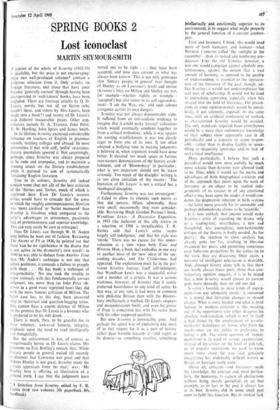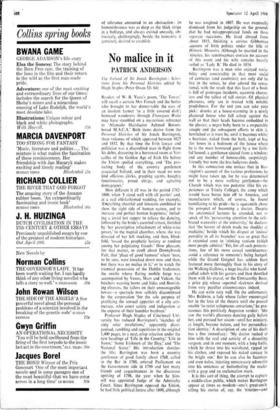Lost iconoclast SPRING BOOKS 2
MARTIN SEYMOUR-SMITH
A reprint of the whole of Scrutiny (1932-53) is available, but the price is not encouraging; these two well-produced volumes* contain a generous selection from it. Only articles on foreign literature, and those. that have since become 'generally current' through having been incorporated in 'well-known' books, have been cx9Inded. There are fourteen articles by Q. D. Leavis, mostly but not all on fiction (why haven't these, and others by Mrs. Leavis, been made into a book?) and twenty of Dr Leavis's omit hitherto inaccessible pieces. Other con- tributors include D. A. ,Traversi, John Peter, D. W. Harding, John Speirs and James Smith.
In its lifetime Scrutiny exercised considerable influence on teachers of English in grammar schools, training colleges and abroad. In most universities it met with stiff, 'polite' resistance; literary journalists ignored it. Not surprisingly, perhaps, since Scrutiny was always prepared to be rude and unpopular, and to maintain a running attack on the literary establishment while it pursued its aim of systematically 'revaluing' English literature.
True to its colours, Scrutiny did indeed contain some (but not all) of the best criticism of the 'thirties and 'forties, much of which is reprinted here. Even Dr Leavis's severest critics would have to concede that the sense in which the roughly contemporaneous Horizon was 'more civilised' or 'better mannered' than Scrutiny is frivolous when compared to the latter's advantages in seriousness, passionate lack of pretentiousness and superior knowledge. This can very easily be seen in retrospect.
Thus Dr Leavis saw through W. H. Auden long before he went out of fashion. Reviewing The Ascent of F6 in 1936, he pointed out that there 'can be no significance in the drama that is not active in the dramatist's own words'; in 1940 he was able to deduce from Another Time that `Mr Auden's technique is not one that solves problems; it conceals a failure to grapple with them . . . He has made a technique of irresponsibility.' No one took the trouble to argue seriously with this fundamentally correct judgment, any more than (as John Peter ob- serves in a good essay reprinted here) they did with the more famous criticism of Milton. The litter case has, to this day, been answered only in rhetorical and question-begging terms. One cannot base a cogent defence of Milton on the premise that Dr Leavis is a bounder who is prepared to let his side down. . . .
There is much, then, to be grateful for in these volumes: awkward honesty, integrity, emphasis upon the need to read intelligently and thoughtfully.
Efut the achievement is not, of course, as unequivocally heroic as Dr Leavis claims. His Comment on Eric Bentley's remark that, 'While literary people in general waited till recently to discover that Lawrence was great and that Aldons Huxley is not great, Scrutiny made the correct appraisals from the start,' was: `Mr Bentley here is offering an illustration of a general truth. I say that the judgments have A Selection from Scrutiny edited by F. R. LeaVis (cuP two volumes .30s paperback Ms... hardback) turned out to be right . . . they have been accepted, and now pass current as what has always been known.' This is not only grotesque (few 'literary people in general" ever thought of Huxley as on Lawrence's level) and untrue (Scrutiny's lines on Milton and Shelley are not, for example—whether rightly or wrongly— 'accepted') but also comic in its self-aggrandise- ment—`I am the Way, etc:' and such solemn arrogance carries its own dangers.
Scrutiny was not always demonstrably right. It suffered from an anti-realistic tendency to imagine that it could make 'correct' valuations which would eventually combine together to form a critical orthodoxy; while it was against the existing establishment, it was too clearly eager to form one of its own. It too often adopted a bullying tone in making judgments it believed in, when argument would have done better. It devoted too much space to furious over-earnest denunciations of the literary estab- lishment, and of `Bloomsbury' in particular: what is not important should not be taken seriously. Too much of the disciples' writing is in too close imitation of the master: 'The Imitation of Dr Leavis' is not a critical but a theological discipline.
Furthermore, Scrutiny was too intransigent: it failed to allow its enemies such merits as they did possess. Often, admittedly, these were small; occasionally they were consider- able. Reviewing Hugh Gordon Porteus's book, Wyndham Lewis : A Discursive Exposition, in 1933 (the inclusion of this silly review in a selection of 1968 is inexplicable), T. R. Barnes said that Lewis's satire 'seems largely self-indulgence,' and that his style was `sterile.' There was no excuse for this under- valuation at a time when both Time and Western Man, a book that embodies in one way or another most of the 'new' ideas of the suc- ceeding decades, and The Childermass had appeared. The explanation must lie in the per- sistent Scrutiny fantasy, itself self-indulgent, that Wyndham Lewis was a successful writer and a member of a coterie. It was a serious weakness, however, of Scrutiny that it sourly preferred boorishness to any kind of satire. In that way, at any rate, it had more in common with philistine Britain than with the Blooms- bury intellectuals it loathed. Dr Leavis suspects and misunderstands Swift, and even his praise of Pope is concerned less with his satire than with his other supposed qualities.
But now Sow/fly is irrevocably gone. And perhaps the aptest way of explaining why most of us feel respect for it as a part of history rather than warmth towards it—and regret at its demise—as something creative, something intellectually and emotionally superior to its environment, is to suggest what might properly be the general function of a current counter- part.
First and foremost, I think, this would need• more of both humanity and humour—what Norman Cameron called 'the sunlight in the cucumber'—than its tusked and lumbering pre- decessor. Like the old Scrutiny, however, a new one would campaign against scholarly pre- tentiousness, against the notion that a vast amount of learning, as opposed to the quality of understanding, is essential to the apprecia- tion of the literature of the past: though, un- like Scrutiny, it would not underemphasise the real uses of scholarship. It would not be kind• to journalistic ignorance, especially when this strayed into the field of literature. The preten- sions of some opinion-makers would be merci- lessly, if not solemnly, exposed. At the same time, such an artificial conformity of outlook as characterised Scrutiny would be avoided. The only standards required from contributors would be a more than rudimentary knowledge of their subject (now apparently rare in all periodicals) and a capacity to argue respon- sibly—rather than to display facility in space- filling or disguising ignorance and/or lack of real critical intelligence.
More particularly, 1 believe that such a periodical would now most usefully be much more eclectic than Scrutiny ever allowed itself to be. Thus, while it would see the merits and advantages of both biographical criticism and of the approach that insists upon the work of literature as an object to be studied inde, pendently of its creator or of any emotional effect it may have upon the reader, it would con- demn the dogmatism inherent in both systems —the latter more severely for its untenable and perhaps dehumanising claims to be 'scientific.'
It is now unlikely that anyone would make Scrutiny's error of regarding the drama only as a reading-text; nevertheless, a new and thoughtful, less journalistic, non-fashionable critique of the theatre is badly needed. As for poetry: the reaction to close analysis has already gone too far, resulting in film-star treatment, for poets, and permitting sometimes even ludicrous projections by the critics on to the work they are discussing. Once again, a measure of intelligent eclecticism is desirable.. And, although history alone tells us that there are nearly always fewer poets about than con- temporary opinion suggests, it is to be hoped that a new Scrutiny would choose its current gods more shrewdly than the old one did. . . . Scrutiny's hostility to most kinds of experi- mentalism was ultimately sterile: it amounted to a denial that literature changes or should change. What is most needed and what is most lacking in modern criticism is the weeding out of the opportunist who either disguises his absolute traditionalism (which is not in itself a bad thing) by the employment of pseudo- modernist techniques or, worse, who foists his incoherence on the public in preference to taking a job. The whole question of `experi- mentalism' is in need of serious examination; instead of lip-service on the level of pub-talk, or of popular exposition, we need to know much more about the way such genuinely imaginative but undeniably difficult writers as Borges or Sarraute really work.
Above all, criticism—and literature—needs the knowledge, the courage and, most particu- larly, the humanity, to eschew all abstractions without being merely parochial; to set that example, as.in fact in the past it always has at its best. Scrutiny did in some small part seem to fulfil this function. But its studied lack of tolerance amounted to an abstraction : its humourlessness was as deep as the thick stripe in a bullseye, and always existed uneasily, ob- trusively, challengingly, beside the humanity it genuinely desired to establish.











































 Previous page
Previous page